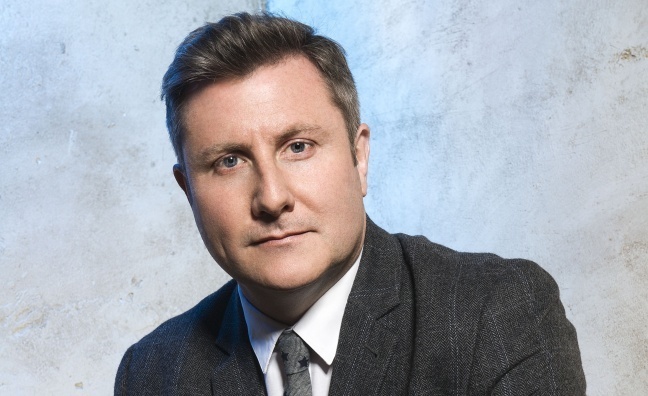BBC Radio 1 has unveiled plans for its 50th anniversary, with controller Ben Cooper pledging the radio station has a future for at least “another 50-odd years”.
Radio 1 will embrace its history with the launch of a three-day digital pop-up station, Radio 1 Vintage, commemorating some of its most famous presenters and programmes, while a special Live Lounge month will see numerous contemporary stars celebrate the music of the last five decades.
“Radio 1 is probably one of the most famous radio stations in the world,” Cooper declared. “It has a connection with this country and with people growing up and that’s something I hope people can enjoy over the three days that they listen to Radio 1 Vintage.”
The September 30 anniversary itself will be marked by a special co-broadcast by current Radio 1 Breakfast Show host Nick Grimshaw and Tony Blackburn, the first DJ to be heard on Radio 1 back in 1967. The one-hour show will be simulcast across Radio 1, Radio 2 (which also celebrates its 50th anniversary on the same date) and the Radio 1 Vintage pop-up station.
Cooper, who joined Radio 1 in the ‘90s as a producer and is also controller of 1Xtra and the Asian Network, said: “I’m really looking forward to that. These two people who are so passionate about Radio 1 and the music they play, coming together… That should be a lot of fun.”
He defended Grimshaw’s role at the station, despite falling ratings for the flagship Breakfast Show. The show pulled in 5.14 million listeners in Q1 2017, according to RAJAR.
“Grimmy’s great,” said Cooper. “He’s doing a difficult job because people will judge him through RAJAR, but I judge him differently. I asked him to do a job, which was to shed older listeners and make Radio 1 younger – and he’s done that. He’s brilliant at creating a young, zeitgeisty, energetic breakfast show. He is the No.1 youth breakfast show in the UK, so long may it continue.”
Meanwhile, some of the biggest names in Radio 1 history, including the likes of John Peel, Noel Edmonds, Kenny Everett, Pete Tong, Zoe Ball, Steve Lamacq, Tim Westwood, Chris Moyles, Simon Mayo, Zane Lowe, Jo Whiley, Fearne Cotton and Simon Bates will be heard on Radio 1 Vintage, with 50 one-hour shows featuring archive material and personal reminiscences about the station, as well as music from the last five decades and even some old jingles, as performed by the likes of ABBA, Jimi Hendrix and The Who. Disgraced former presenters such as Jimmy Savile and Dave Lee Travis will not feature.
And, while the DAB station will service former Radio 1 listeners, its current audience will enjoy a Live Lounge Month 50th Anniversary Special where, in a twist on the current Live Lounge format, acts will perform their own material and cover a hit from the last 50 years. Artists confirmed already include the Foo Fighters, Rag’N’Bone Man and Royal Blood, with many more big names to come.
Despite the nostalgia, Cooper said the station remained focused on its future. Traditional radio listening is under pressure from other media such as streaming services, with Radio 1’s latest RAJAR audience figure down 8.1% year-on-year to 9.1 million.
“We live in a very different world to the one we grew up in, however old we are,” said Cooper. “The smartphone is 10 years old and we’re addicted to our mobile phones. Radio 1 has to make sure that, if it’s to continue to bring in new, young and diverse audiences, it needs to be on mobile phones. That’s why we’ve had this strategy of, Listen, watch, share.
“Yes, we’ve still got 10 million people listening to us every week on a radio, in the kitchen and the car, but we now know that most people go to bed with their mobile phone. That’s what Radio 1 has been doing and needs to continue to do: create new ways for you to engage with [it] on your mobile phone.”
Cooper said the “Listen, watch, share” strategy would “futureproof” the station, in conjunction with the original BBC pledge to “Inform, educate, entertain”.
“We inform people about new music, especially British music – that is our core role,” said Cooper. “We educate with things like our mental health campaign. And we entertain with what I hope is the most diverse set of presenters on the dial. We keep those very foundations of the BBC true to ourselves but we need to look to the future as well.”
Cooper reiterated his oft-stated claim that RAJAR figures don’t give a true reflection of his station’s reach as they don’t take into account YouTube views or social media numbers. But he maintained that Radio 1 still held a central role in UK youth culture.
“At a time of disaggregation for young people and so much choice, actually having a central point to gather round is probably more important than ever,” he said. “Whether that be Ed Sheeran coming in and launching his new album on the Breakfast Show or the Duke and Duchess [Of Cambridge] who, when they wanted to talk about mental health, came onto Radio 1 and presented the chart. They knew coming to Radio 1 was important because Radio 1 still has that hold on being the soundtrack to young people’s lives in the UK.
“It reflects the zeitgeist,” he added. “You’ve got DJs that have great relationships with the audience and you’re able to reflect back young people’s culture. That means Radio 1 has a future, not just for the next few years, but for another 50-odd years.”









